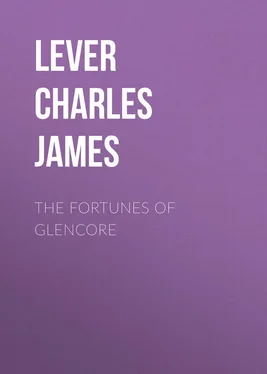Charles Lever - The Fortunes Of Glencore
Здесь есть возможность читать онлайн «Charles Lever - The Fortunes Of Glencore» — ознакомительный отрывок электронной книги совершенно бесплатно, а после прочтения отрывка купить полную версию. В некоторых случаях можно слушать аудио, скачать через торрент в формате fb2 и присутствует краткое содержание. Жанр: literature_19, foreign_antique, foreign_prose, на английском языке. Описание произведения, (предисловие) а так же отзывы посетителей доступны на портале библиотеки ЛибКат.
- Название:The Fortunes Of Glencore
- Автор:
- Жанр:
- Год:неизвестен
- ISBN:нет данных
- Рейтинг книги:4 / 5. Голосов: 1
-
Избранное:Добавить в избранное
- Отзывы:
-
Ваша оценка:
- 80
- 1
- 2
- 3
- 4
- 5
The Fortunes Of Glencore: краткое содержание, описание и аннотация
Предлагаем к чтению аннотацию, описание, краткое содержание или предисловие (зависит от того, что написал сам автор книги «The Fortunes Of Glencore»). Если вы не нашли необходимую информацию о книге — напишите в комментариях, мы постараемся отыскать её.
The Fortunes Of Glencore — читать онлайн ознакомительный отрывок
Ниже представлен текст книги, разбитый по страницам. Система сохранения места последней прочитанной страницы, позволяет с удобством читать онлайн бесплатно книгу «The Fortunes Of Glencore», без необходимости каждый раз заново искать на чём Вы остановились. Поставьте закладку, и сможете в любой момент перейти на страницу, на которой закончили чтение.
Интервал:
Закладка:
Here he looked fixedly at Upton, who smiled a most courteous acquiescence in the opinion, – a politeness that made poor Harcourt perfectly ashamed of his own rudeness, and he continued hurriedly, —
“He’ll have abundance of money. The life Glencore leads here will be like a long minority to him. A fine old name and title, and the deuce is in it if he can’t rub through life pleasantly enough with such odds.”
“I believe you are right, after all, Harcourt,” said Upton, sighing, and now speaking in a far more natural tone; “it is ‘rubbing through’ with the best of us, and no more!”
“If you mean that the process is a very irksome one, I enter my dissent at once,” broke in Harcourt. “I ‘m not ashamed to own that I like life prodigiously; and if I be spared to say so, I ‘m sure I ‘ll have the same story to tell fifteen or twenty years hence; and yet I ‘m not a genius!”
“No,” said Upton, smiling a bland assent.
“Nor a philosopher either,” said Harcourt, irritated at the acknowledgment.
“Certainly not,” chimed in Upton, with another smile.
“Nor have I any wish to be one or the other,” rejoined Harcourt, now really provoked. “I know right well that if I were in trouble or difficulty to-morrow, – if I wanted a friend to help me with a loan of some thousand pounds, – it is not to a genius or a philosopher I ‘d look for the assistance.”
It is ever a chance shot that explodes a magazine, and so is it that a random speech is sure to hit the mark that has escaped all the efforts of skilful direction.
Upton winced and grew pale at these last words, and he fixed his penetrating gray eyes upon the speaker with a keenness all his own. Harcourt, however, bore the look without the slightest touch of uneasiness. The honest Colonel had spoken without any hidden meaning, nor had he the slightest intention of a personal application in his words. Of this fact Upton appeared soon to be convinced, for his features gradually recovered their wonted calmness.
“How perfectly right you are, my dear Harcourt,” said he, mildly. “The man who expects to be happier by the possession of genius is like one who would like to warm himself through a burning-glass.”
“Egad, that is a great consolation for us slow fellows,” said Harcourt, laughing; “and now what say you to a game at écarté ; for I believe it is just the one solitary thing I am more than your match in?”
“I accept inferiority in a great many others,” said Upton, blandly; “but I must decline the challenge, for I have a letter to write, and our post here starts at daybreak.”
“Well, I’d rather carry the whole bag than indite one of its contents,” said the Colonel, rising; and, with a hearty shake of the hand, he left the room.
A letter was fortunately not so great an infliction to Upton, who opened his desk at once, and with a rapid hand traced the following lines: —
Mv dear Princess, – My last will have told you how and when I came here; I wish I but knew in what way to explain why I still remain! Imagine the dreariest desolation of Calabria in a climate of fog and sea-drift: sunless skies, leafless trees, impassable roads, the out-door comforts; the joys within depending on a gloomy old house, with a few gloomier inmates, and a host on a sick bed. Yet, with all this, I believe I am better; the doctor, a strange, unsophisticated creature, a cross between Galen and Caliban, seems to have hit off what the great dons of science never could detect, – the true seat of my malady. He says – and he really reasons out his case ingeniously – that the brain has been working for the inferior nerves, not limiting itself to cerebral functions, but actually performing the humbler office of muscular direction, and so forth; in fact, a field-marshal doing duty for a common soldier! I almost fancy I can corroborate his view, from internal sensations; I have a kind of secret instinct that he is right. Poor brain! why it should do the work of another department, with abundance of occupation of its own, I cannot make out. But to turn to something else. This is not a bad refuge just now. They cannot make out where I am, and all the inquiries at my club are answered by a vague impression that I have gone back to Germany, which the people at F. O. are aware is not the case. I have already told you that my suggestion has been negatived in the Cabinet: it was ill-timed, Allington says; but I ventured to remind his Lordship that a policy requiring years to develop, and more years still to push to a profitable conclusion, is not to be reduced to the category of mere à propos measures. He was vexed, and replied weakly and angrily. I rejoined, and left him. Next day he sent for me, but my reply was, “I was leaving town;” and I left. I don’t want the Bath, because it would be “ill-timed;” so that they must give me Vienna, or be satisfied to see me in the House and the Opposition!
Your tidings of Brekenoff came exactly in the nick. Allington said pompously that they were sure of him; so I just said, “Ask him if they would like our sending a Consular Agent to Cracow?” It seems that he was so flurried by a fancied detection that he made a full acknowledgment of all. But even at this, Allington takes no alarm. The malady of the Treasury benches is deafness, with a touch of blindness. What a cumbrous piece of bungling machinery is this boasted “representative government” of ours! No promptitude, no secrecy! Everything debated, and discussed, and discouraged, before begun; every blot-hit for an antagonist to profit by! Even the characters of our public men exposed, and their weaknesses displayed to view, so that every state of Europe may see where to wound us, and through whom! There is no use in the Countess remaining here any longer; the King never noticed her at the last ball; she is angry at it, and if she shows her irritation she ‘ll spoil all. I always thought Josephine would fail in England. It is, indeed, a widely different thing to succeed in the small Courts of Germany, and our great whirlpool of St. James. You could do it, my dear friend; but where is the other dare attempt it?
Until I hear from you again I can come to no resolution. One thing is clear, – they do not, or they will not, see the danger I have pointed out to them. All the home policy of our country is drifting, day by day, towards a democracy: how, in the name of common sense, then, is our foreign policy to be maintained at the standard of the Holy Alliance? What an absurd juxtaposition is there between popular rights and an alliance with the Czar! This peril will overtake them one day or another, and then, to escape from national indignation, the minister, whoever he may be, will be driven to make war. But I can’t wait for this; and yet, were I to resign, my resignation would not embarrass them, – it would irritate and annoy, but not disconcert. Brekenoff will surely go home on leave. You ought to meet him; he is certain to be at Ems. It is the refuge of disgraced diplomacy. Try if something cannot be done with him. He used to say formerly yours were the only dinners now in Europe. He hates Allington. This feeling, and his love for white truffles, are, I believe, the only clews to the man. Be sure, however, that the truffles are Piedmontese; they have a slight flavor of garlic, rather agreeable than otherwise. Like Josephine’s lisp, it is a defect that serves for a distinction. The article in the “Beau Monde” was clever, prettily written, and even well worked out; but state affairs are never really well treated save by those who conduct them. One must have played the game himself to understand all the nice subtleties of the contest. These, your mere reviewer or newspaper scribe never attains to; and then he has no reserves, – none of those mysterious concealments that are to negotiations like the eloquent pauses of conversation: the moment when dialogue ceases, and the real interchange of ideas begins.
Читать дальшеИнтервал:
Закладка:
Похожие книги на «The Fortunes Of Glencore»
Представляем Вашему вниманию похожие книги на «The Fortunes Of Glencore» списком для выбора. Мы отобрали схожую по названию и смыслу литературу в надежде предоставить читателям больше вариантов отыскать новые, интересные, ещё непрочитанные произведения.
Обсуждение, отзывы о книге «The Fortunes Of Glencore» и просто собственные мнения читателей. Оставьте ваши комментарии, напишите, что Вы думаете о произведении, его смысле или главных героях. Укажите что конкретно понравилось, а что нет, и почему Вы так считаете.












